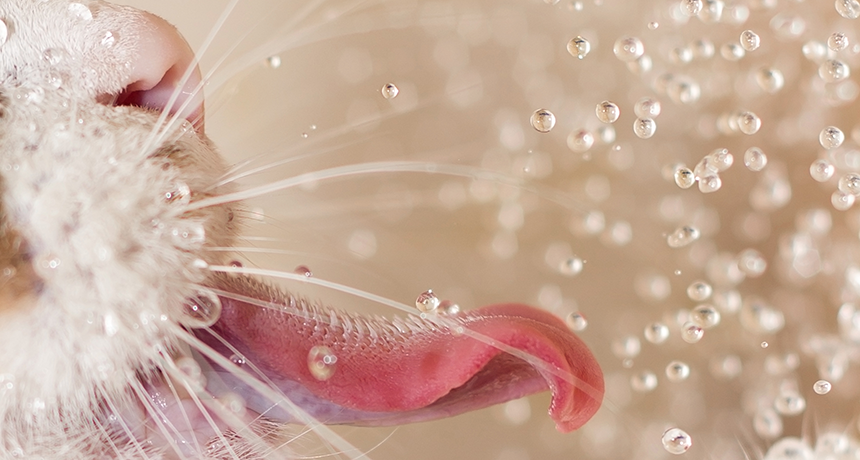Tongues ‘taste’ water by sensing sour
Acid-sensing cells — which help us taste sour foods — also help mammals detect water

From cats to rats to humans, mammals know when they’re drinking water. A new scientific study shows how.
Oranit6666/istockphoto
Many people would say pure water tastes like nothing. But if water has no flavor, how do we know what we’re drinking is water? Our tongues do have a way to detect water, a new study shows. They do it not by tasting the water itself, but by sensing acid — which we usually call sour.
All mammals need water to survive. That means they should be able to tell whether they’re putting water in their mouths. Our sense of taste has evolved to detect other important substances, such as sugar and salt. So detecting water would make sense too, Yuki Oka says. He studies the brain at the California Institute of Technology in Pasadena.
Oka and his colleagues had already found that a brain area called the hypothalamus (Hy-poh-THAAL-uh-mus) can control thirst. But the brain alone can’t taste. It has to receive a signal from the mouth to know what we’re tasting. “There has to be a sensor that senses water, so we choose the right fluid,” Oka says. If you couldn’t sense water, you might drink another liquid by accident. And if that liquid is toxic, that could be a fatal mistake.
To hunt for this water sensor, Oka and his group studied mice. They dripped onto the animals’ tongues liquids with different flavors: sweet, sour and savory. They also dripped pure water. At the same time, the researchers recorded the electrical signals from the nerve cells attached to the taste buds. As expected, the scientists saw strong nerve responses to all the flavors. But they saw a similar strong response to water. Somehow, the taste buds were detecting water.
The mouth is a wet place. It’s filled with saliva — a mixture of enzymes and other molecules. They include bicarbonate ions — tiny molecules with negative charge. The bicarbonate makes saliva, and your mouth, a little bit basic. Basic substances have a higher pH than pure water. They are the opposite of acidic substances, which have a lower pH than water.
When water pours into your mouth it washes away that basic saliva. An enzyme in your mouth instantly kicks in to replace those ions. It combines carbon dioxide and water to make bicarbonate. As a side effect, it also produces protons.
The bicarbonate is basic, but the protons are acidic — and some taste buds have a receptor that senses acid. These receptors to detect the flavor we call “sour” — like in lemons. When the newly made protons hit acid-sensing receptors, the receptors send a signal to the taste bud nerve. And the taste bud nerve fires — not because it detected water, but because it detected acid.
To confirm this, Oka and his group used a technique called optogenetics. With this method, scientists insert a light-sensitive molecule into a cell. When light shines on the cell, the molecule triggers an electrical impulse.
Oka’s team added a light-sensitive molecule to the sour-sensing taste bud cells of mice. Then they shined light on the animals’ tongues. Their taste buds reacted and the animals licked, thinking they sensed water. If the light was attached to a water spout, the animals would lick it — even though the spout was dry.
Story continues below video.
The team also knocked out the sour-sensing molecule in other mice. That means they blocked the genetic instructions for making this molecule. Without it, those mice couldn’t tell if what they were drinking was water. They’d even drink a thin oil instead! Oka and his group published their results May 29 in the journal Nature Neuroscience.
“This provides a starting point for how the detection for water is processed in the brain,” says Scott Sternson. He works at a Howard Hughes Medical Institute research center in Ashburn, Va. He studies how the brain controls behavior but was not part of this study. Sternson says it’s crucial to learn how we sense simple but vital things, such as water. “It’s important for the basic understanding of how our bodies work,” he says. The study was in mice, but their taste systems are similar to those of other mammals, including humans.
Just because acid-sensing molecules sense water doesn’t mean that water “tastes” sour. It doesn’t mean water has a flavor at all. Flavor is a complex interaction between taste and smell. Acid-sensing cells detect sour, and they detect water. But water detection, Oka notes, “is not water taste perception.” So water may still taste like nothing. But to our tongues, it’s definitely something.







